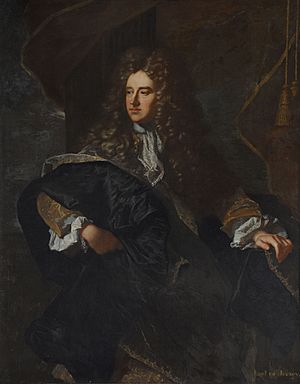Edward Villiers, 1st Earl of Jersey facts for kids
Quick facts for kids
The Earl of Jersey
|
|
|---|---|

Portrait by Godfrey Kneller
|
|
| Secretary of State for the Southern Department | |
| In office 1699–1700 |
|
| Monarch | William III |
| Preceded by | James Vernon |
| Succeeded by | James Vernon |
| Personal details | |
| Born | c. 1656 Kingdom of England |
| Died | 25 August, 1711 (aged 54–55) Kingdom of Great Britain |
| Spouse | Barbara Chiffinch |
| Parents |
|
| Occupation | Peer, landowner, and statesman |
Edward Villiers, 1st Earl of Jersey (born around 1656, died 25 August 1711) was an important English nobleman and politician. He was part of the famous Villiers family.
He was given the titles of Baron Villiers and Viscount Villiers in 1691. Later, in 1697, he became the Earl of Jersey. Edward Villiers was a key member of the Tory political group. He served as the Southern Secretary starting in 1699. This was a very important job in the government.
Who Was Edward Villiers?
Edward Villiers came from a well-known family. His father was Sir Edward Villiers (1620–1689). His mother was Frances Howard. She was the youngest daughter of Theophilus Howard, 2nd Earl of Suffolk.
His grandfather was Sir Edward Villiers (around 1585–1626). He was in charge of the Royal Mint. He was also the half-brother of George Villiers, 1st Duke of Buckingham. Edward's sister, Elizabeth Villiers, was also famous. She was a close friend of King William III. She later became the Countess of Orkney.
His Education
Edward Villiers went to St John's College, Cambridge in 1671. This was a well-known university at the time.
What Did He Do?
Edward Villiers held many important roles in the royal household. He took over from his father as the Knight Marshal. This job involved keeping order in the royal court.
He was also in charge of the horses for Queen Mary II. Later, he became the Lord Chamberlain for King William III and Queen Anne. This role meant he managed the royal household.
In 1696, he represented England at the Congress of Ryswick. This was an important meeting where countries signed a peace treaty. He also served as an ambassador in The Hague and Paris. An ambassador represents their country in another nation.
In 1699, he became the Secretary of State for the Southern Department. This was a top government position. He was also one of the Lords Justices of England three times. These officials helped govern when the monarch was away.
In 1704, Queen Anne removed him from his job. However, in 1711, she decided to bring him back into her Cabinet. Sadly, he passed away shortly after.
His Family Life
On 17 December 1681, Edward Villiers married Barbara Chiffinch. She was the daughter of William Chiffinch. He was a trusted friend of King Charles II.
Edward and Barbara had two sons and one daughter:
- William Villiers, who became the 2nd Earl of Jersey (around 1682–1721).
- Henry Villiers (died 1743).
- Mary Villiers (died 17 January 1734/35). She married twice. Her first husband was Thomas Thynne. They had a son named Thomas Thynne, 2nd Viscount Weymouth. Her second husband was George Granville, 1st Baron Lansdowne.
How He Died
Edward Villiers died on 25 August 1711. He passed away suddenly from a stroke. He had just been appointed to another important role, the Lord Privy Seal, by the Queen.
 | Bayard Rustin |
 | Jeannette Carter |
 | Jeremiah A. Brown |

